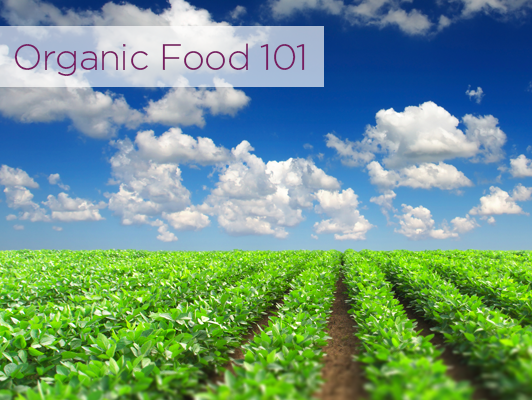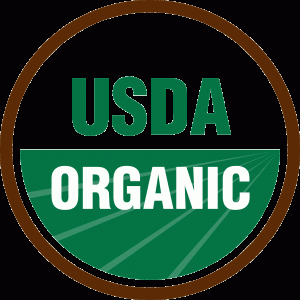What does “organic” mean?
These days, organic is a hot-button issue, and I’m asked a lot of questions about eating organic. What does “organic” mean? Should I switch to organic foods? Why are organic foods so expensive, compared to conventional foods? Can I eat healthy without eating organic? In this mini-series, we’re going to take a look at these questions and others!
What is “organic?”
“Organic” is a term regulated by the US Department of Agriculture (USDA). Only farmers who are certified can use it, and they must submit to annual inspections. Certified organic products can be identified by the USDA organic seal, which looks like this:
If a product is certified organic, that means that the farmer/rancher/manufacturer is using practices that generally preserve the environment, and not using materials like pesticides or antibiotics. General organic principles are described by the Organic Foods Production Act of 1990, enacted by Congress. The USDA defines specific standards.
In food processing, there are three categories of products that can be certified organic (cosmetics and textiles can also be certified):
- Organic crops – You can feel confident that crops carrying this label were produced without the use of synthetic fertilizers or prohibited pesticides, and that genetically modified organisms were not used.
- Organic livestock – Farmers of organic livestock must treat the animals humanely, properly care for their health, use 100% organic feed, and provide the animal with access to the outdoors. Antibiotics and growth hormones may not be used (the use of hormones or steroids have never been permitted in poultry, pork or goat).
- Organic multi-ingredient foods – These are foods like bread, crackers, and soup. If you see the seal, you can be sure the product contains at least 95% organic ingredients. If the label says “made with organic ingredients,” you can know that the ingredients identified in the ingredient list are certified organic.
Is organic food healthier?
There are no studies to date that show organic foods are nutritionally superior to conventional foods. However, that’s not the reason most people will tell you they eat organic. Many people are concerned about pesticide residue and genetically modified organisms (GMOs). They choose organic foods to avoid these things. Others are concerned with animal welfare, and choose organic because the animals are treated more humanely.
Should I eat organic?
The Environmental Protection Agency (EPA) sets limits on pesticides, herbicides, and rodenticides under the Federal Insecticide, Fungicide, and Rodenticide Act to ensure proper use and safety. And multiple studies have been conducted on GMOs, and have found no differences in them versus non-GMOs, and have been approved for use in our food supply. So the avoidance of these things comes down to personal choice. Also, organic foods are typically more expensive due to maintaining certification and fewer yields.
As with all things, an educated decision is the best decision you can make. Gather all the facts and do what makes the most sense to you. Remember, it’s possible to eat healthy or unhealthy organic food, and healthy or unhealthy non-organic food. It all comes down to food choice. Whether you decide to eat organic or not, the most important thing is to eat a variety of foods daily. Choose lots of whole grains, vegetables and fruit, and moderate low-fat/nonfat dairy and lower fat protein sources (beans and legumes, chicken, fish, and eggs).
If you need help balancing your choices, visit MyPlate, or call a UPMC Health Plan Health Coach at 1-800-807-0751.





